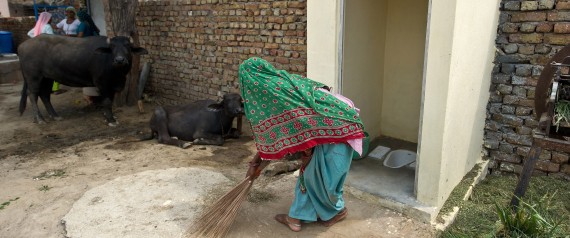Winchester
SENIOR MEMBER

- Joined
- Aug 12, 2014
- Messages
- 4,412
- Reaction score
- 8
- Country
- Location

I remember the women so clearly. They were sitting cross-legged, in a hamlet somewhere in India's western Orissa state, making bricks. Because I was there to research a book on toilets and sanitation, I asked them if they had toilets. No, they said. I knew that 2.6 billion people worldwide don't have a toilet, and that 1 billion do something called "open defecation," which means toileting in fields, roadsides or by train tracks.
But the women told me something I hadn't heard. "I get up before dawn," said one, "and I go and knock for my friend. Then we go to the field together." The women said they always go under cover of darkness, and never alone. Men lurk and watch, and worse.
No country in the world has more open defecation than India, where one in two people defecate outside. Every year, 200,000 children in India die from diseases caused by fecal contamination. Although open defecation has been reduced by 31 percent since 1990, about 300 million women and girls in India still have no other choice. Try to squat in a sari, while holding a cup of water to cleanse yourself and keeping an eye out for rapists.
"They had gone out to use the field as a toilet; they had been gang raped and lynched."
The risks are real: In 2014, two girls were found hanging from a tree in Katra Sahadatganj. They had gone out to use the field as a toilet; they had been gang raped and lynched. There was a brief outcry and were articles linking their murders to the lack of toilets.
Then came a backlash from writers such as the academic Shilpa Phadke and the head of policy at WaterAid India, Nitya Jacob. The murders were due to caste issues, they argued. Indian women and girls are raped everywhere, all the time.
Shilpa Phadke wrote in Al Jazeera that toilets at home could damage women's ability to use public space. They like going to the fields together and chatting, she wrote. No woman I have ever met has said she liked squatting in darkness knowing that men are watching her.
"Toilets must be demand-driven, and the demand can come from women like Priyanka."
I once met a woman who married, moved to her in-laws' house and was woken at 4 a.m. that first night to go to the field with her mother-in-law. She stuck it out for three days, then left. She wasn't willing to accept life without a latrine. In rural India, it was a scandalous thing to do. Her case got media attention, and the NGO Sulabh built her a toilet.
After the two girls were lynched, Sulabh installed 100 toilets in the village. But Sulabh can't build toilets for the whole country. And even if it did, there is no guarantee people would use them. A RICE institute study found that 40 percent of respondents who had a toilet or latrine had at least one family member who continued to defecate in the open.
Prime Minister Narendra Modi's Swachh Bharat ("Clean India") campaign was launched in 2014, but it has problems. Critics suggest that it's installing toilets without consulting their users. That's a recipe for an unused toilet. That's because human software - psychology -- is more important than hardware, sometimes, when it comes to persuading people to change a habit.
"Brides will refuse to marry into families that don't have a toilet. It's a movement nicknamed 'No loo, No I do.'"
Toilets must be demand-driven, and the demand can come from women like Priyanka. Her actions have become increasingly common: Brides will refuse to marry into families that don't have a toilet. It's a movement nicknamed "No loo, No I do." Gujarat passed a state law that forbids candidates in local elections from running for office if they don't have a toilet at home. Some of these measures are criticized for being punitive. But we must use whatever works. This is an emergency of public health and safety but also of human dignity.
Access to toilets can't hurt, unlike the chronic, acute shame, embarrassment and fear that Indian women and girls must deal with at least once a day, every day.
© Zocalo Public Square
Open Defecation in India Leads to Rape and Disease. Now, Women Are Demanding Toilets. | Rose George









